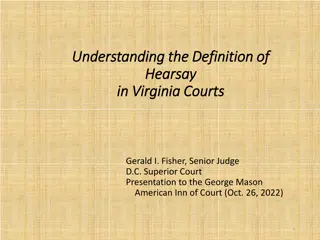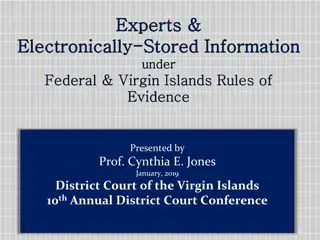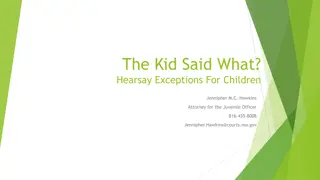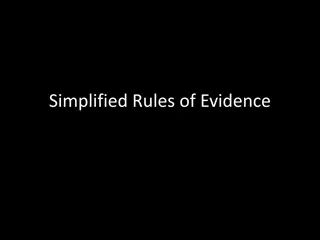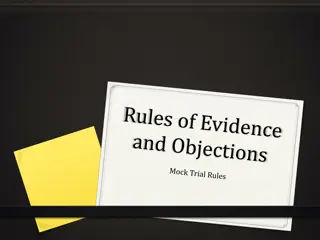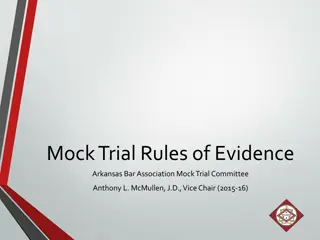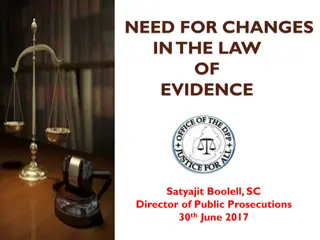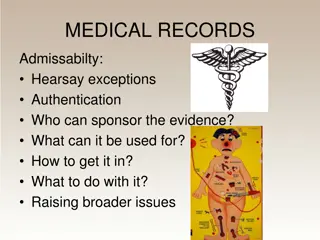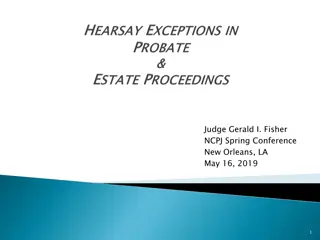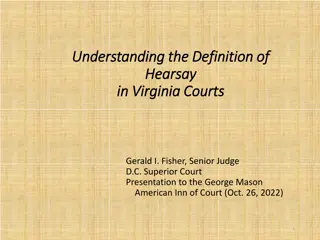Understanding the Definition of Hearsay in Virginia Courts by Gerald I. Fisher, Senior Judge
Preliminary principles and rules regarding hearsay in Virginia courts, including the effective date of the Virginia Rules of Evidence, application of rules in various trial scenarios, criteria for admissibility of evidence by trial judges, and reasons for the legal distrust of hearsay evidence. The
1 views • 78 slides
Understanding Electronically Stored Information in Legal Cases
This presentation covers the admissibility and authentication of Electronically Stored Information (ESI) under the Federal and Virgin Islands Rules of Evidence. Topics include recent changes to the rules, expert testimony on ESI, hearsay objections, and the analysis of admissibility criteria such as
0 views • 43 slides
Understanding Hearsay Exceptions for Children in Legal Proceedings
Exploration of hearsay exceptions for children in legal contexts, including how out-of-court statements are considered, the importance of minimizing emotional trauma for children, and specific cases illustrating the application of special exceptions in child abuse situations.
1 views • 22 slides
Understanding Simplified Rules of Evidence in Trial Proceedings
Simplified Rules of Evidence outline key principles such as leading questions, narration, relevance, hearsay, opinions, and procedures in a nutshell. Admissibility of evidence depends on arguments as well. Learn how to handle objections effectively to navigate legal proceedings smoothly.
0 views • 35 slides
Understanding Evidence Rules in Legal Proceedings
Evidence rules in legal proceedings serve multiple vital purposes such as ensuring a fair hearing, preventing the waste of time and resources, and excluding unreliable or prejudicial evidence. Various types of questions are discussed, including leading questions, argumentative questions, speculation
0 views • 20 slides
Understanding Mock Trial Rules of Evidence
Mock Trial Rules of Evidence are crucial for determining the admissibility of testimony and evidence in a trial setting. Students preparing for cases need to assess evidence admissibility, make timely objections, and be prepared to defend testimony. The rules cover objections, specific objections ty
0 views • 36 slides
Need for Changes in the Law of Evidence: Perspectives and Reforms
Information by which facts are proved forms the essence of the law of evidence, regulating how facts are established in courts. This article discusses the exclusionary ethos, statutory reforms, challenges with hearsay evidence, and examples of reforms from different countries like England, Wales, Au
0 views • 18 slides
Understanding Medical Records in Legal Proceedings
Medical records play a crucial role in legal cases as evidence, subject to rules like authentication and exceptions to hearsay. Exhibits such as ambulance reports and discharge summaries are commonly used. Hearsay exceptions like statements for medical diagnosis and treatment are allowed. Proper cer
0 views • 17 slides
Understanding Hearsay Rules and Exceptions in Legal Proceedings
Hearsay evidence, which is an out-of-court statement introduced for the truth of its content, is considered less reliable in court due to factors like lack of oath, inability to see demeanour of declarant, and absence of cross-examination. Various historical judgments and legal exceptions allow cert
0 views • 90 slides
Understanding Hearsay in Virginia Courts - Key Principles and Rules
Virginia's rules of evidence, particularly regarding hearsay, have specific principles and rules that guide the admissibility of evidence in various trial settings. The presentation by Judge Gerald I. Fisher sheds light on how the court determines the admissibility of evidence, including considerati
0 views • 54 slides
